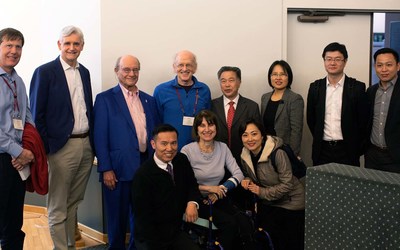Cold Spring Harbor Laboratory (CSHL) has received a USD $5 million donation from BGI Group, the global genomics leader headquartered in Shenzhen, China
|
COLD SPRING HARBOR, N.Y., May 13, 2019 /PRNewswire/ -- Cold Spring Harbor Laboratory (CSHL) has received a USD $5 million donation from BGI Group, the global genomics leader headquartered in Shenzhen, China. The gift establishes and preserves the BGI Nobel Laureates Archives, comprising all of the current and future personal collections of Nobel laureates.
The BGI Nobel Laureates Archives currently include Sydney Brenner, Francis Crick, Walter Gilbert, Carol Greider, Alfred Hershey, Barbara McClintock, Hermann Muller, Richard Roberts and James Watson. The late Sydney Brenner said, "It pleases me greatly to hear that BGI will join in this venture." Walter Gilbert praised the new archives: "This will be great for BGI, for CSHL, and for science in general," he said. BGI shares the roots of human genetics history with CSHL, starting with the Human Genome Project (HGP). BGI grew out of the vision of its founders to participate in the HGP, and led China's contribution to the effort. Celebrating BGI's 20 year anniversary, BGI and many of its employees donated to CSHL to protect and digitize the archives, making these resources readily available to the public. "We appreciate this opportunity for BGIers to contribute to the great course of inheriting, preserving, and more importantly, sharing with and learning from the common heritage of mankind," said Huanming "Henry" Yang, BGI Co-founder, and Chairman of BGI Research and frequent participant in CSHL's annual Biology of Genomes meeting. CSHL President & CEO Bruce Stillman, Ph.D. said, "The BGI donation is instrumental to the maintenance and growth of these very important collections at CSHL," adding that it was "especially meaningful to have our two institutions linked together in perpetuity." The CSHL Archives includes the personal collections of nearly two dozen influential scientists. The BGI gift will help CSHL archivists curate and maintain the collections of Nobel laureates and provide the opportunity for scholars to research the history of the life sciences. To explore the CSHL Archives visit http://library.cshl.edu/archives/ About BGI Group About Cold Spring Harbor Laboratory
SOURCE Cold Spring Harbor Laboratory |





